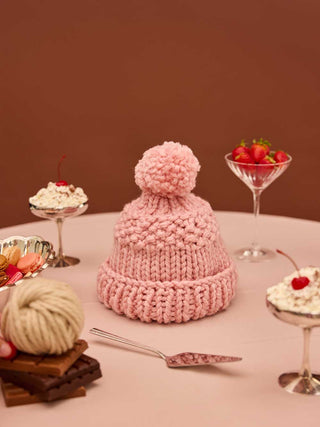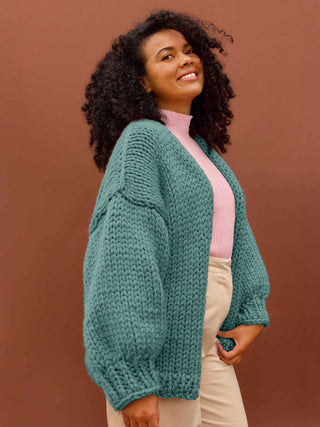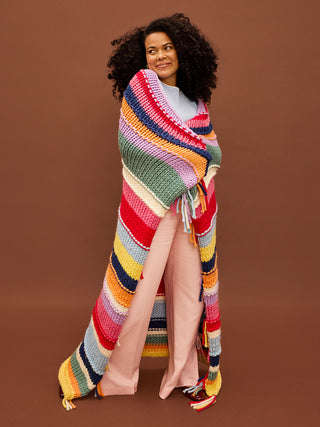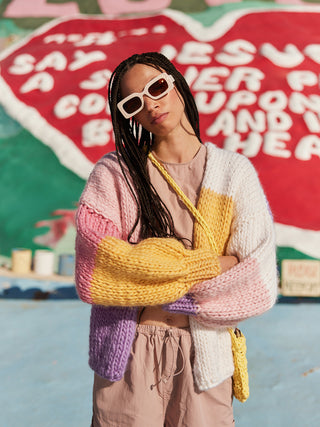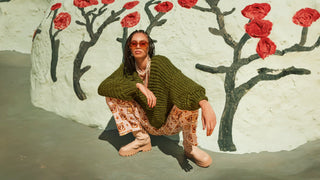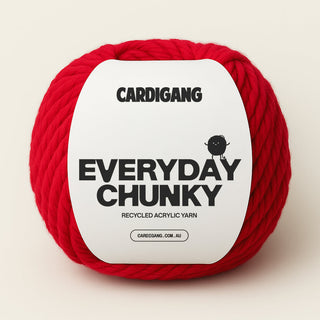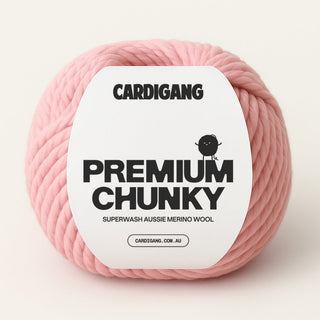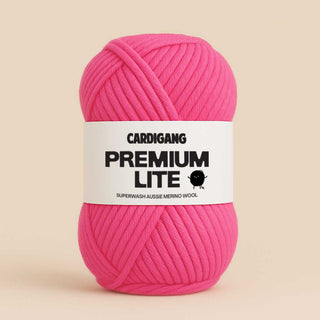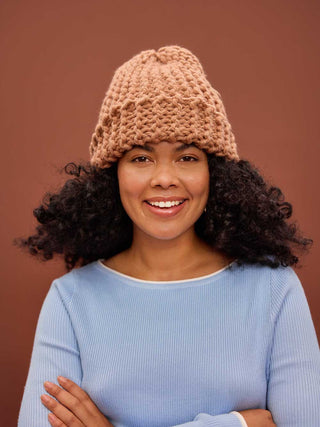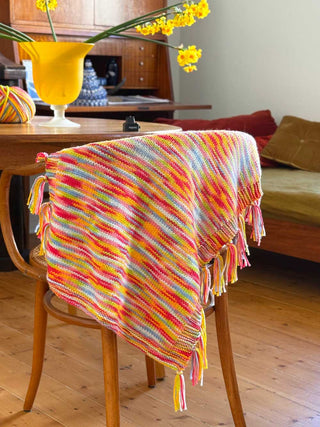A step-by-step guide to knitting the super-sweet Freya Beanie
Ever gotten halfway through a project and thought “Hang on, am I even doing this right?” We have 🙋♀️
That’s why we’ve created these step-by-step guides to walk you through the knitting process.
Even if you've never knitted before, we'll take you from zero to knitting hero in no time 🦸♀️
When it comes to knitting, practice makes perfect
Before we start the pattern, we suggest you spend some time learning the basic techniques you’ll need to complete your masterpiece 🤓
The Freya Beanie is a dream to knit up and the perfect beginner project. She's made using just one (yes one!) stitch type - the famous knit stitch. You'll want to be confident with the knit stitch before we start. You'll also want to get a hang of tying a slip knot and casting on your stitches which is the first step in any knitting project.
You can use the yarn that came in your kit to practice with. Once you've got these mastered you'll fly through your beanie.
Total beginner? 👩🏫
For a more comprehensive lesson on the basics of knitting visit our Learn How To Knit page.
🥣 Test your tension
While we're practising and before you start your project, you'll want to make sure your tension (how tightly or loosely your knitting is) is juuuust right. We do this by knitting a “tension swatch”. It's a bit like goldilocks, if the tension is too tight, your piece will be too small, and if it's too loose it may not hold its shape and might be too big.
Gauge: Your 10x10cm knitted swatch should be 8.5 stitches wide and 12 rows high when knitted in garter stitch (knit stitch) on your 12mm needles.
To test this, jump on your needles and cast on 14 stitches, then knit every stitch in every row for 14-16 rows. Then measure a 10x10cm square and count your stitches and rows within that space to make sure you're knitting at the correct tension.
If you've got more stitches or rows than the instructions say you should have, your knitting is a little too tight, and if you've got less your knitting is too loose. Adjust your tension by holding the yarn a little more tightly/loosely as you knit.

Onto the beanie, babe!


⚡️What you'll need
Your kit comes with everything you'll need to make your masterpiece. In your kit you'll find;
- 12mm needles
- 200 grams of Cardigang Chunky Merino Wool
- A darning needle
- Made by me tag
You also want to have a pair of scissors handy.
🧶 Let's knit our way to cosy-town!
Time to get click-clacking and whip up your warm-as-toast beanie.
Remember learning a new skill can be a little challenging at first, and you’re bound to find yourself making some mistakes along the way. But as with learning anything, your brain and your hands slowly start to get the hang of it, muscle memory is created, and soon the thing you found tricky/daunting/scary is like second nature! 💪
If you need a reminder of the techniques, just head back up the page and watch the videos again.

STEP 1
We knit our beanie flat in a big rectangle which we sew together at the end. This makes Freya perfect for beginners!
So to start, we're going to cast on our stitches using our 12mm needles.
💭 A note on your needles. Your needles are connected by a tube which makes them what we call 'circular needles'. For our purposes, we're going to use them as if they are straight needles. So we'll knit our work back and forth from your left needle to your right.
Hot tip: your piece will 'grow' as you knit so don't be alarmed if it looks like you're knitting a baby's beanie to start with!
STEP 2
We make our beanie in knit stitch (otherwise known as garter stitch). So you're going to knit 53 rows.
🌈 Change colour as you like to create your candy-shop rainbow.
🎬 Watch How To Change Colour
STEP 3
Yes legend, you've (almost) made a beanie! 🕺
Time to cast off your stitches!
When you've got just one stitch left on your right needle, simply cut your yarn from the ball (leaving about 20cm) and thread it back through your last stitch to secure it.
STEP 4
At this point, you'll have a lovely long, multi-coloured rectangle. It's time to sew this baby today.
We're going to join the cast-on and cast-off edges together. You can see these marked in the picture below.
Fold your rectangle in half so the cast-on and cast-off edges are butting up to each other.

STEP 5
Thread your darning needle with around 30cm of yarn and we're going to sew from the bottom up to the top.
We use a technique called the invisible seam technique which gives us a nice neat join. In the video below, we cover two variations of the technique - you can pick which you prefer!
📹 Watch How To Sew Cast Off Edges Together
💭 If you're anything like us you might find seaming a bit of a pain and hard to make super neat. It's a common beginner challenge! The main principle with seaming is no matter what seaming method you use, be sure you are entering into the same place on each stitch along the seam. This consistency makes it harder to see the seam.
STEP 6
The final thing we need to do is to close the top of our beanie. We do this by collecting the end loops/stitches from each row and pulling them together with a length of yarn.
So, thread your darning needle with another 30cm of yarn and then thread your needle through the loops along the top edge of your beanie. Pull gently but firmly to secure the stitches together and make sure that the opening is fully closed. Secure with a knot on the inside of your beanie.
D.O.N.E! You've finished your beanie, well done! Epic work 🤩 If this was your first-ever knitting project or one of many, we hope you had a blast click-clacking and making your masterpiece 💥❤️
Looking for something a little more personal?
Sign up for a one-on-one knitting or crochet session with the Cardigang Hotline ☎️. These sessions are designed to help give you the skills you need to create a masterpiece. Whether you're just starting out, or you've got a specific question or problem (dropped a stitch, no stress!), we're here to get you out of a bind.


